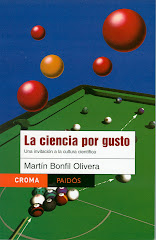Published in Milenio Diario, July 8th, 2009
 In other occasions have commented the similarities between biological evolution and democracy (and economy, and science).
In other occasions have commented the similarities between biological evolution and democracy (and economy, and science).In an ideal democracy, a group of citizens, who are supposed to be rational and to possess the information necessary to make thoughtful decisions, selects from a group of candidates the one they think is best. The analogy with natural selection, in which the environment selects the best adapted individuals for survival, is clear.
The same happens in an ideal economy, where "the market" (buyers) select products or services, and thus companies, that offer the best quality/price balance: the selected ones survive, the less efficient go extint.
In science, selection is made by a sort of "elitist democracy", in which a group of specialists (the scientific community) choose, among the great variety of theories proposed, the ones that turn out to be more convincing.
In all cases there's a variety of candidates and a system that select which will survive at the end.
The difference lies in the criteria used for selection. In evolution, anything that gives an advantages to an organism will increase its survival. In science, the factors that determine if a theory is accepted by the community vary, but there's one that stands out: the rational judgment of the facts and arguments presented to support it. Although deviations may occur, science tends to make rational decisions.
On the other hand, in economy and democracy, decisions -even though politicians and economists hate to accept it- are often far from being rational. In extreme cases, the decisions are made based on emotional factors, which are easily manipulated through marketing strategies (in Mexico's elections on july 5th, the "null vote" was a very successful protest, in the face of a system that is not working).
(translated by Adrián Robles Benavides)
To receive Science for pleasure weekly
in your email, subscribe here!





No comments:
Post a Comment